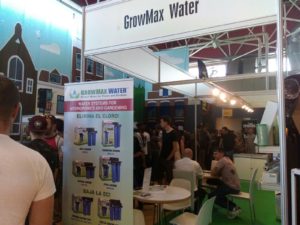Surely more than once you have gone out of the pool with irritated eyes. Maybe even, after spending a lot of time, you have felt that the skin starts to itch. It is certainly not the water that produces these effects in our body, but the responsible one is a chemical compound added as a disinfectant:
It’s about chlorine. During the reading of this article, we invite you to have in mind this question: would you water your plants with the water in your pool?
Why is chlorine added to water? 
This compound is added to water in the form of sodium hypochlorite, which dissolves and acts to destroy the bacteria’s membrane. In local swimming pools, due to the large number of bathers there may be, the amounts of chlorine are usually high. In addition, the fact that the heat multiplies with the heat motivates in many cases the increase in the quantities used. Although in this context this may be necessary to maintain bacteriological quality, have we begun to think about how chlorine can affect our health? After all, he is not alone in the pools, but in the whole network of running water.
As in the swimming pools it is necessary to keep the water clean and free of bacteria, this is also done with the network water. It is the last part of the purification process, and thanks to its residual effect ensures that while flowing through underground ducts or accumulates in a gigantic deposit does not form mold or is contaminated by pathogenic organisms. But if we feel its effects just by spending time in the pool, how does chlorinated water affect us in our day to day?
Effects of chlorine on health
Chlorine has a strongly irritating effect, and even at relatively low concentrations, it can have negative consequences. Contact with the skin and eyes produces irritation, burning and itching. If pure chlorine is inhaled it is highly toxic: it causes pain in chest, vomiting, cough and breathing disturbances. Although it is found in considerably reduced quantities and relatively safe for human consumption, even within the permitted quantities can cause damage to the skin and respiratory tract.
Chlorine in the crop
For growers, chlorinated water is also a problem: chlorine does not discriminate between harmful microorganisms and beneficial microorganisms: it simply kills all microscopic life. For plants, however, much of that life is essential, since it enriches the substrate and interacts with the plant so that it absorbs nutrients better.
The main ones of these microorganisms are the mycorrhizae, fungi that live in symbiosis with the roots and allow them not only to improve their absorption, but also to keep them free of pathogens and protected against harmful fungal invasions. They also make them more resistant to adverse environmental conditions.
The organic fertilizers are rich in this microscopic life, but all this contribution is completely useless if the plants are irrigated with chlorinated water, since as we mentioned before, the chlorine is not selective, it kills everything equally. This is why it is even more important not to water with chlorine when using insecticides or
ecological pesticides, biostimulants, fungal protectors or biofertilizers. The presence of chlorine in the irrigation water can be to reduce the harvest, in addition to making the organic products used in the crop useless or in the better, negatively affect the taste, appearance and nutritional qualities of the crop product.

How to eliminate chlorine?
Aware of the problem that chlorine in water can represent, many choose to leave containers with chlorinated water in the sun for 24 hours, trusting that since chlorine is volatile it will evaporate. But how safe can it be that this is it like that? Without a reliable, laboratory measurement, it is impossible to know for sure that the chlorine is gone, and you run the risk of using chlorinated water anyway.
Why, then, do not use a reliable system to eliminate chlorine? It is best to filter the water through an Activated Carbon filter block, which also reduces or eliminates other contaminants that may be present in the water.
At GrowMax Water all our equipment includes high capacity block carbon filters. These filters are manufactured using a high performance coconut charcoal, with more micropores than other types of coal, achieving a unique filter and with greater absorption capacity than any other filter on the market.
In addition, in line with our commitment to protecting the environment, high-performance coconut coal from our equipment is made using a patented process that reduces gas emissions.
Our range of filtration systems eliminates up to 99% of the chlorine while providing sufficient water flow for use in daily irrigation. We have four models, whose water flow is 240L/h the smallest to 2,000L/h.
To conclude: chlorine may be necessary until it reaches your home, but you must eliminate it to have a better quality of water for you and your crop. Your harvest will thank you!

 In many cases, water from a well or a canal is used for irrigating a garden. While quality always differs from zone to zone, it’s never advisable to use well water, without a previous water analysis, due to possible presence of bacteria as well as pesticides and herbicides that can come from neighboring farms.
In many cases, water from a well or a canal is used for irrigating a garden. While quality always differs from zone to zone, it’s never advisable to use well water, without a previous water analysis, due to possible presence of bacteria as well as pesticides and herbicides that can come from neighboring farms.  Hard Water
Hard Water
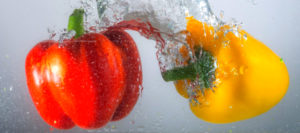

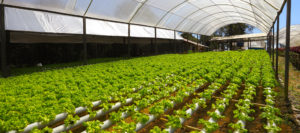
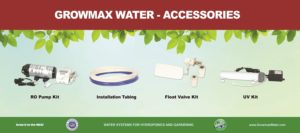
 The inlet water pressure is the most important factor for good operation of a reverse osmosis system. So, once you have your RO system installed, you need to check the pressure gauge to see the inlet water pressure.
The inlet water pressure is the most important factor for good operation of a reverse osmosis system. So, once you have your RO system installed, you need to check the pressure gauge to see the inlet water pressure.
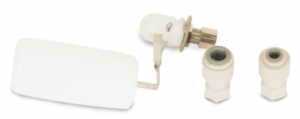 Maybe on more than one occasion you have forgotten about the water as you were filling your tanks…. and the water overflows. This is a typical situation that has happened to more than one of us.
Maybe on more than one occasion you have forgotten about the water as you were filling your tanks…. and the water overflows. This is a typical situation that has happened to more than one of us. GrowMax Water RO systems eliminate Chlorine, sediment and dissolved salts from water, providing pure and clean water. But if you are using water from an underground well, it’s very probable that this water also contains viruses and bacteria, and a good way to eliminate them is with the UV Lamp Kit.
GrowMax Water RO systems eliminate Chlorine, sediment and dissolved salts from water, providing pure and clean water. But if you are using water from an underground well, it’s very probable that this water also contains viruses and bacteria, and a good way to eliminate them is with the UV Lamp Kit.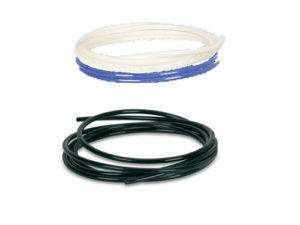 All GrowMax Water systems include a complete installation kit with a 3 meters of feed water tubing, 3 meters of product water tubing and 3 meters drain tubing.
All GrowMax Water systems include a complete installation kit with a 3 meters of feed water tubing, 3 meters of product water tubing and 3 meters drain tubing.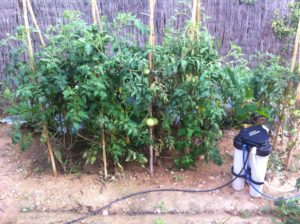
 We can follow the irrigation advice previously written to achieve the best results, but if we do it with chlorinated water we won’t get them. Vegetables and fruits won’t be of such quality as we want, because chlorine will interfere on the results.
We can follow the irrigation advice previously written to achieve the best results, but if we do it with chlorinated water we won’t get them. Vegetables and fruits won’t be of such quality as we want, because chlorine will interfere on the results.
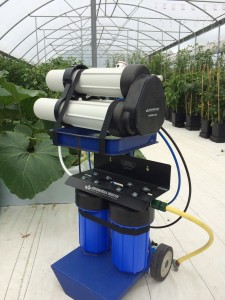 1. Prevent precipitated limescale inside the humidifier’s tank
1. Prevent precipitated limescale inside the humidifier’s tank
